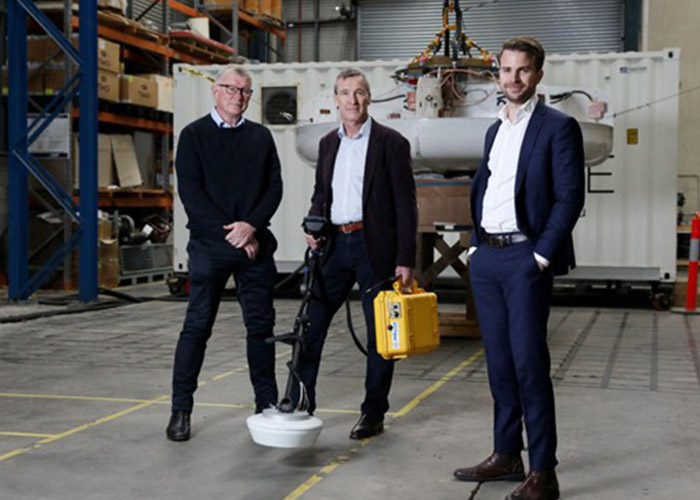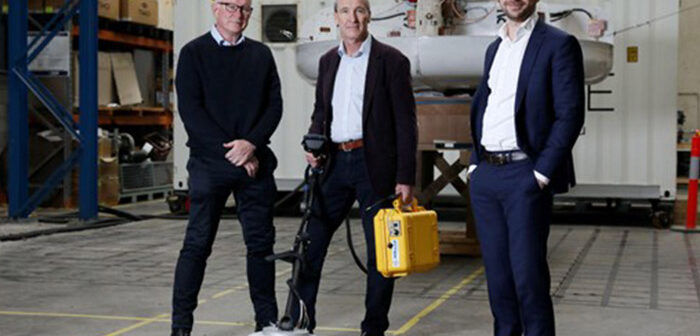
A new Australian deep-tech company, MagnaTerra Technologies Ltd, launches today, backed by some of the country’s leading investors in technology, science and mining. Formed through the merger of mining innovator NextOre Ltd and explosives detection startup MRead Ltd, the launch follows the completion of a $11 million capital raise.
MagnaTerra combines more than two decades of sovereign innovation in Magnetic Resonance (MR) sensing, a rapid, accurate, and safe detection technology developed by CSIRO to detect minerals, explosives and narcotics at a molecular level.
The capital raise will enable the company to continue developing game-changing sensors that enable improved processes in humanitarian demining, defence, critical minerals and border security markets, where global demand is intensifying. MagnaTerra will expand their detection capabilities for target explosives, critical minerals for bulk sorting, and iron ore sensing applications.
RFC Ambrian Funds Management’s QCM Fund participated in the round, alongside Shaw and Partners’ wealth management group and individual investors.
The company’s capital table also includes Australia’s national science agency, the CSIRO, as well as global engineering group Worley Ltd, electronic solutions developer Codan Ltd and global industrial manufacturer Gebr. Pfeiffer SE.
RFC Ambrian has been an investor in both MRead and NextOre since their founding. RFC chair Rob Adamson will also chair the newly formed entity. He said MagnaTerra was a natural fit with the fund’s mandate.
“MagnaTerra is a sovereign tech platform with real revenue, high-impact IP, and clear global applications,” Mr Adamson said.
“The company takes outstanding, world-leading detection technology developed by our national science agency, CSIRO, that has significant potential to improve the economics and reduce the environmental impact of producing copper and other critical minerals as well as important applications in the detection of explosives for humanitarian demining, border security and defence,” he said.
The board also includes MRead Co-founder and former CSIRO Research Director Nick Cutmore, MRead CEO John Shanahan, NextOre Non-Executive Director Kim Cavallaro, former Codan CTO Peter Charlesworth and current Codan EGM Daniel Hutchinson.
MagnaTerra will continue to operate under established brands: NextOre for minerals and MRead for security, defence, and humanitarian applications.
NextOre’s systems are already operating in Chile, Zambia and the Philippines with customers including Lundin Mining, First Quantum and Newcrest. The platform helps copper miners offset the effects of declining ore grades and dramatically reduce energy, water and chemical use by rejecting waste rock close to the source. It’s now being adapted for lithium and iron ore, with future applications across critical minerals such as cobalt, antimony and bismuth.
“By enabling 100% ore scanning in real time, our technology makes mines more productive and sustainable,” said NextOre CEO Chris Beal.
“MagnaTerra is a compelling opportunity for investors looking for scalable solutions at the intersection of deep tech, sustainability, and security.”
MRead’s handheld mine detector, developed in partnership with the CSIRO and trialled successfully in Angola with The HALO Trust, uses MR sensing to directly detect RDX – one of two main explosive compounds commonly used in landmines globally.
The approach drastically reduces false positives compared to metal detectors and can cut clearance time by up to 30%. The technology is an essential contribution by Australia’s scientific community to emerging global conflict in non-combat applications.
“Landmines are one of the great unresolved global challenges. Our technology promises to save lives and restore land to communities faster and more safely,” said MRead and MagnaTerra CEO John Shanahan.
The same MR technology is being adapted to detect narcotics and explosives in cargo, without opening packages or using harmful radiation.
“This merger is a consolidation of world-leading science, engineering and commercial momentum into a single vehicle with global reach,” Mr Shanahan said.






